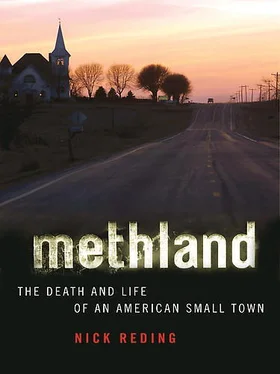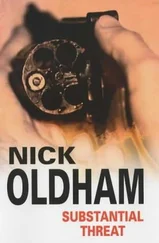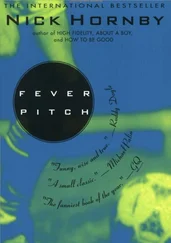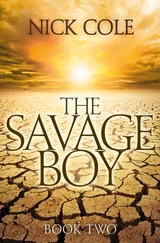The extension of Constance’s analysis is that during a drug epidemic, instinct demands that we find something wrong with those who are addicted; the epidemic in effect tricks us into thinking that the relatively small number of addicts are anomalies, even as we acknowledge the drug’s large-scale presence. In August 2005, Newsweek printed a now-famous series of photos of meth addicts, whose faces first seemed to age and then practically to disintegrate over time. I remember thinking the pictures looked like propaganda paintings from World War II of German soldiers, or “Huns,” who had been deliberately dehumanized. Similarly, the addicts shown in Newsweek were so gaunt and lifeless that they seemed utterly disengaged from humanity. Those photos served in some way to distance not only the addicts themselves but also the rural United States, from which the addicts invariably came, from the nation at large. For me, a true chronicle of the height of the meth years from 2005 to 2008 must begin with a town and all its people. If meth alone were to define Oelwein—and through it, the entire small-town United States—the truth would be hopelessly obscured. And the truth is, Clay and Major, Nathan and Roland, Murphy and Lori and the people in the Do Drop Inn—these people are us.
Among the regulars at the Do Drop Inn are Josh and Ben, two obese, bike-riding nineteen-year-olds who more or less control the two seventy-five-cent pool tables. There is also Lisa, an unemployed, near sighted epileptic known on the Oelwein karaoke circuit as Flipper; and Sophie, who by twenty-four was in a coma following a car accident, from which she emerged a year later having to once again learn to talk, walk, and eat, and whose social outlets are composed of walking her cat on a leash every night to McDonald’s and then heading over to drink Diet Pepsi at the Do Drop Inn. Add to this a rotating gallery of white supremacist skinheads, tweakers, whiggers (the local moniker for white kids who wear the long, baggy clothing associated with urban blacks), bikers, and farm kids, and the Do Drop, in Clay Hallberg’s formulation, can feel at times very much like an unsupervised outpatient clinic.
There is method to the mayhem, however. The Do Drop’s owner, Mildred Binstock, is more den mother than boss, and knows pretty much everything about everyone who comes in. Mildred has pretty olive skin and dark brown eyes. She wears blouses in wild, colorful prints, has appliquéd eyebrows, and is not someone who shies away from lipstick. At five-feet-eleven Mildred is what might be described as well fed: not fat, exactly, but not without a predilection for chicken tenders either. She is sixty years old and has never married. She does not drink, and she’s never smoked a cigarette, despite having worked from five P.M. to two A.M. nightly at the Do Drop Inn since she bought the place in 1984. That, says Mildred, was two years before what she describes as the “schnapps revolution,” which accounts for the prodigious amount of flavored DeKuyper’s behind the bar in peach, blackberry, and butterscotch, which she maintains nearly doubled her liquor sales.
Back in 2005, someone at the Do Drop Inn was getting busted—for assault, selling meth, fighting, or contributing to the delinquency of a minor—about once every two weeks on average. Most recently, the police went upstairs to one of the three floors where Mildred rents rooms weekly and monthly and kicked down the door to find a seventeen-year-old girl in flagrante delicto with a forty-year-old man. On the table next to them was the eight-ball of crank she’d just sold him. When Nathan Lein took me to the Cop Shop on my first day in Oelwein, I told him my plan to hang out at the Do Drop, in hopes of meeting any of the addicts and dealers as they appeared in mug shots on Chief Logan’s computer screen, Nathan said, “Good luck. Even cops won’t go in there alone.”
Mildred watches the Fox News Channel whenever she is not asleep. She can tell you what shows are on at what times on a twenty-four-hour schedule. She refers to her decorating style as either High Amish Kitsch or Late Victorian Clutter. In front of an enormous television flanked by red lace curtains, Mildred’s customers sit at formal dinner tables complete with high-backed dining room chairs decorated with Christmas lights. Behind the bar is a smoke-glass mirror in which, if you’re observant, you can see the ever-frugal Mildred stealthily reuse the straw from one customer’s finished whiskey and Coke in the fresh vodka tonic of another. The walls represent five decades of yard-sale finds: mounted fish, vintage pieces of bank china, calendars dating back to the Johnson administration. A sign stapled above the door to the kitchen reads “My office! No one allowed but ME!” Above the door is another television, which is often tuned to the man Mildred refers to as “my number-one honey”: Geraldo Rivera.
In Mildred’s estimation, Mayor Murphy and Chief Logan were crooks. They were what was wrong with Oelwein, pure and simple. The more ordinances they passed trying to rid the town of meth, the more Mildred considered them to be infringing on her civil rights. She was not alone. From an anecdotal perspective, Oelwein back in 2005 was deeply factioned regarding the police, the mayor, and Nathan Lein and his boss, county attorney Wayne Sauer. The upshot was that, in a poor town where half of all commercial space sat unoccupied, Mildred Binstock was not going to take kindly to police action in her bar. She was barely making it as it was, working seven days a week in an unending series of shifts that lasted deep into the night. Clay Hallberg, Nathan Lein, and Roland Jarvis all told me that more meth got sold at the Do Drop Inn than at any other bar in Oelwein. When I pressed Mildred about this, she insisted she was being set up. Then she added cryptically that, in her opinion, “The police are canoodling with the bad elements of this burg.”
One early evening in particular brought home the complexity of the divisions in Oelwein, as expressed in its most notorious bar. It was a Sunday, and Mildred and I were the only two in the place. We were watching the news, which at the time was concentrated on the case of a young Mormon girl who’d been kidnapped from her Salt Lake City bedroom while her sister slept next to her; police suspected the handyman. Into the Do Drop Inn walked a man and a girl. The girl looked sixteen or seventeen, and the man over thirty. He was wearing denim Carhartts and a matching work jacket, each dirty enough to have been through a long day of building road in a dust storm. He had long, dirty, sharp fingernails, and he smelled like sour milk. The girl’s hair was bobbed and greasy, and her body was lost inside an enormous gray sweatshirt that read “Duluth Is a Cool City” across the front, in homage to the brutality of Minnesota winters. It was immediately obvious to me from their dilated pupils and the man’s aura of violently aggressive confidence that they were high on meth.
“You can’t be twenty-one, honey,” Mildred said to the girl as she studied her driver’s license. Mildred then looked at the girl sternly with one appliquéd eyebrow raised, waiting for her to admit her true age. When the girl didn’t respond, Mildred said brightly, “But if the state says you are, then you are.” She looked at the man. “I know you’re over,” she said to him coldly. She gave them the drinks they’d ordered. Then, even though no one ordered any food, Mildred hurried into the kitchen, leaving the three of us alone in the empty bar.
The man was named Chad and the girl Ella. There was a computerized Keno machine at one end of the bar, and Ella went with her drink, sat down, and started tapping at the screen. She was four stools away from me, and seven away from Chad; I was between them. Chad and I talked about one thing and another, looking for some common ground. For instance, when I said I was born in Missouri, he allowed how he’d been in jail there once. His pupils completely obscured the blue of his irises.
Читать дальше












